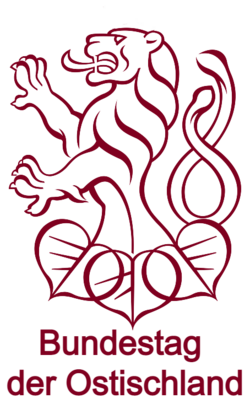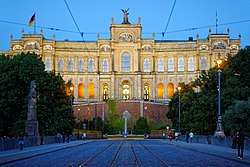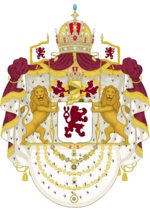Bundestag of Werania: Difference between revisions
Britbong64 (talk | contribs) No edit summary |
Britbong64 (talk | contribs) No edit summary |
||
| (5 intermediate revisions by the same user not shown) | |||
| Line 6: | Line 6: | ||
| house_type = Bicameral | | house_type = Bicameral | ||
| jurisdiction = | | jurisdiction = | ||
| houses = [[ | | houses = [[House of Councillors (Werania)|House of Councillors]]<br>[[House of Deputies (Werania)|House of Deputies]] | ||
| term_limits = | | term_limits = | ||
| foundation = | | foundation = | ||
| Line 16: | Line 16: | ||
| leader1 = [[Charlotte II of Werania|Charlotte II]] | | leader1 = [[Charlotte II of Werania|Charlotte II]] | ||
| election1 = 18 February 1987 | | election1 = 18 February 1987 | ||
| leader2_type = President of the | | leader2_type = President of the House of Councillors | ||
| leader2 = [[Klara Joachim]] | | leader2 = [[Klara Joachim]] | ||
| party2 = {{wp|Independent (politics)|Nonpartisan}} | | party2 = {{wp|Independent (politics)|Nonpartisan}} | ||
| election2 = March 13 2012 | | election2 = March 13 2012 | ||
| leader3_type = | | leader3_type = President of the House of Deputies | ||
| leader3 = [[Jakob Böckler]] | | leader3 = [[Jakob Böckler]] | ||
| party3 = [[National Consolidation Party (Werania)|NKP]] | | party3 = [[National Consolidation Party (Werania)|NKP]] | ||
| election3 = June 7 2019 | | election3 = June 7 2019 | ||
| seats = 232 ([[ | | seats = 232 ([[House of Councillors (Werania)|House of Councillors]])<br>545 ([[House of Deputies (Werania)|House of Deputies]]) | ||
| house1 = [[ | | house1 = [[House of Councillors (Werania)|House of Councillors]] | ||
| house2 = [[ | | house2 = [[House of Deputies (Werania)|House of Deputies]] | ||
| structure1 = 2021 | | structure1 = 2021 HoC.svg | ||
| structure1_res = 270px | | structure1_res = 270px | ||
| structure1_alt = | | structure1_alt = | ||
| structure2 = | | structure2 = 2021 HoD.svg | ||
| structure2_res = 270px | | structure2_res = 270px | ||
| structure2_alt = | | structure2_alt = | ||
| political_groups1 ={{Collapsible list |title= |{{legend|#F0001C|[[Weranic Section of the Workers' International|OSAI]]: 6 seats}} {{legend|# | | political_groups1 ={{Collapsible list |title= |{{legend|#F0001C|[[Weranic Section of the Workers' International|OSAI]]: 6 seats}} {{legend|#CB3036|[[Socialist Workers' Party of Werania|SAPO]]: 4 seats}} {{legend|#1B9431|[[Greens - Ecological Action|Greens]]: 9 seats}} {{legend|#F2D200|[[National Coalition for Independence|NNK]]: 10 seats}} {{legend|#800080|[[Euclean Werania|EO]]: 62 seats}} {{legend|#DDDDDD|{{wp|Independent (politics)|Nonpartisan}}: 5 seats}} {{legend|#04428B|[[Sotirian Democratic Homeland|SDT]]: 4 seats}} {{legend|#FF6A00|[[National Consolidation Party|NKP]]: 130 seats}} {{legend|#116468|[[Democratic Alternative (Werania)|DA]]: 2 seats}} | ||
}} | }} | ||
| political_groups2 = {{Collapsible list |title= |{{legend|#F0001C|[[Weranic Section of the Workers' International|OSAI]]: 22 seats}} {{legend|# | | political_groups2 = {{Collapsible list |title= |{{legend|#F0001C|[[Weranic Section of the Workers' International|OSAI]]: 22 seats}} {{legend|#CB3036|[[Socialist Workers' Party of Werania|SAPO]]: 6 seats}} {{legend|#1B9431|[[Greens - Ecological Action|Greens]]: 80 seats}} {{legend|#ADCFEF|[[Aldman People's Party]]: 2 seats}} {{legend|#F2D200|[[National Coalition for Independence|NNK]]: 31 seats}} {{legend|#800080|[[Euclean Werania|EO]]: 111 seats}} {{legend|#04428B|[[Sotirian Democratic Homeland|SDT]]: 9 seats}} {{legend|#26C4EC|[[United Party (Charlotte Island)|VP-PA]]: 1 seat}} {{legend|#FF6A00|[[National Consolidation Party|NKP]]: 244 seats}} {{legend|#116468|[[Democratic Alternative (Werania)|DA]]: 30 seats}} {{legend|#261060|[[Weranic Völkisch Freedom Party|OVFP]]: 9 seats}} | ||
}} | }} | ||
| committees1 = | | committees1 = | ||
| Line 64: | Line 64: | ||
| first_election2 = | | first_election2 = | ||
| first_election3 = | | first_election3 = | ||
| last_election1 = [[2021 Weranian | | last_election1 = [[2021 Weranian House of Councillors election|2021]] | ||
| last_election2 = [[2019 Weranian federal election|2019]] | | last_election2 = [[2019 Weranian federal election|2019]] | ||
| last_election3 = | | last_election3 = | ||
| next_election1 = [[2024 Weranian | | next_election1 = [[2024 Weranian House of Councillors election|2024]] | ||
| next_election2 = [[Next Weranian federal election|2023]] | | next_election2 = [[Next Weranian federal election|2023]] | ||
| next_election3 = | | next_election3 = | ||
| Line 84: | Line 84: | ||
| footnotes = | | footnotes = | ||
}} | }} | ||
The '''Bundestag of Werania''' ({{Wp|German language|Weranian}}: '''Bundestag der Ostischland'''; ''Federal Diet'') is the {{wp|Bicameralism|bicameral}} {{Wp|legislature}} of the [[Werania]]. It consists of an {{Wp|upper house}} known as the [[ | The '''Bundestag of Werania''' ({{Wp|German language|Weranian}}: '''Bundestag der Ostischland'''; ''Federal Diet'') is the {{wp|Bicameralism|bicameral}} {{Wp|legislature}} of the [[Werania]]. It consists of an {{Wp|upper house}} known as the [[House of Councillors (Werania)|House of Councillors]] (''Kammer der Reichsräte'') and a {{wp|lower house}} known as the [[House of Deputies (Werania)|House of Deputies]] (''Kammer der Abgeordneten'') whilst the monarch presides over parliamentary proceedings. It retains {{wp|parliamentary sovereignty}} over Werania, officially being the representative of the Weranian people. Members of the House of Councillors are referred to as Peers whilst members of the House of Deputies are known as the {{Wp|members of parliament|deputies}}. | ||
The Bundestag took its current form in 1842 following the unification of Werania, being based on the former Reichstag of the [[Kingdom of Cislania]]. The | The Bundestag took its current form in 1842 following the unification of Werania, being based on the former Reichstag of the [[Kingdom of Cislania]]. The original upper house was named the House of Lords was initially entirely hereditary or appointed by the monarch of Werania whilst members of the House of Deputies were elected in a {{Wp|first-past-the post}} system. In 1905 the government introduced {{Wp|proportional representation}} for the House of Deputies. In 1956 the House of Deputies voting system was changed again to a {{wp|parallel system}} with a portion of the seats elected through FPTP and a portion through PR. The House of Lords remained unreformed until 1991 when the government aboished it and introduced an entirely elected chamber, the House of Councillors. | ||
Currently 245 members of the | Currently 245 members of the House of Deputies are elected through single member districts and 300 through proportional representation whilst whilst all members of the House of Councillors are elected via FPTP and SNTV in multi-member districts with half the members elected every six years to three year terms. The next House of Deputies election is expected in 2023; the next House of Councillors election is in 2024. | ||
==History== | ==History== | ||
==Composition== | ==Composition== | ||
| Line 95: | Line 95: | ||
==Committees== | ==Committees== | ||
==Current membership== | ==Current membership== | ||
{{Template:Werania}} | |||
[[Category:Werania]] | [[Category:Werania]] | ||
Latest revision as of 01:24, 11 July 2022
Bundestag of Werania Bundestag der Ostischland | |
|---|---|
 | |
| Type | |
| Type | |
| Houses | House of Councillors House of Deputies |
| Leadership | |
Monarch | Charlotte II since 18 February 1987 |
President of the House of Councillors | |
President of the House of Deputies | |
| Structure | |
| Seats | 232 (House of Councillors) 545 (House of Deputies) |
 | |
House of Councillors political groups | |
 | |
House of Deputies political groups | |
| Elections | |
| FPTP/SNTV | |
House of Councillors last election | 2021 |
House of Deputies last election | 2019 |
House of Councillors next election | 2024 |
House of Deputies next election | 2023 |
| Meeting place | |
 | |
| Palace of Parliament, Westbrücken, Werania | |
The Bundestag of Werania (Weranian: Bundestag der Ostischland; Federal Diet) is the bicameral legislature of the Werania. It consists of an upper house known as the House of Councillors (Kammer der Reichsräte) and a lower house known as the House of Deputies (Kammer der Abgeordneten) whilst the monarch presides over parliamentary proceedings. It retains parliamentary sovereignty over Werania, officially being the representative of the Weranian people. Members of the House of Councillors are referred to as Peers whilst members of the House of Deputies are known as the deputies.
The Bundestag took its current form in 1842 following the unification of Werania, being based on the former Reichstag of the Kingdom of Cislania. The original upper house was named the House of Lords was initially entirely hereditary or appointed by the monarch of Werania whilst members of the House of Deputies were elected in a first-past-the post system. In 1905 the government introduced proportional representation for the House of Deputies. In 1956 the House of Deputies voting system was changed again to a parallel system with a portion of the seats elected through FPTP and a portion through PR. The House of Lords remained unreformed until 1991 when the government aboished it and introduced an entirely elected chamber, the House of Councillors.
Currently 245 members of the House of Deputies are elected through single member districts and 300 through proportional representation whilst whilst all members of the House of Councillors are elected via FPTP and SNTV in multi-member districts with half the members elected every six years to three year terms. The next House of Deputies election is expected in 2023; the next House of Councillors election is in 2024.
